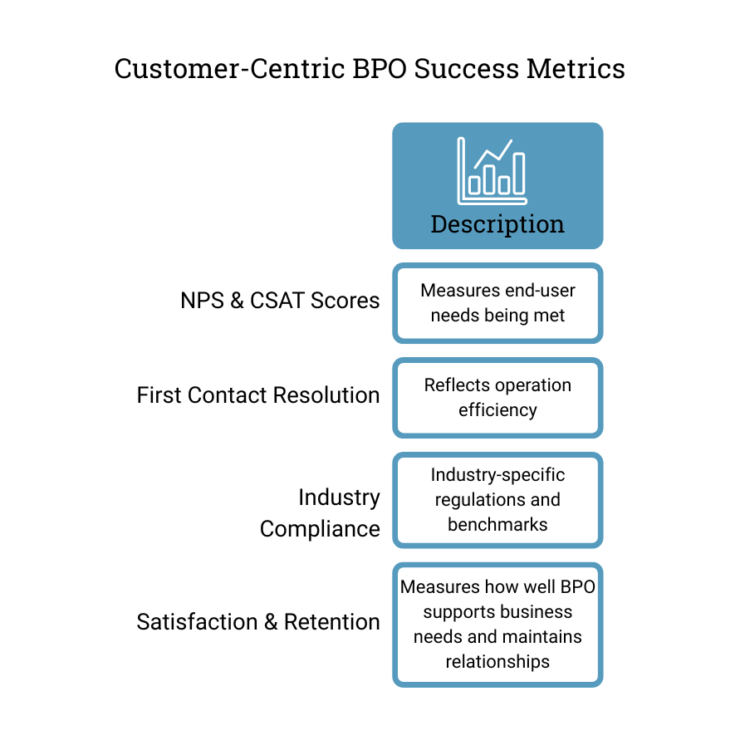Read Time: 7 minutes
Table of Contents
Introduction
Customer expectations are constantly evolving and changing, and that goes extra for niche markets. With these trends always growing and shifting, it’s all the more important to provide personalized service that meets your customers’ precise needs. Business process outsourcing (BPO) is one of the most effective ways to adapt to the times and continue to provide high-quality personalized care, even when you’re working in a specialized, niche industry.
Key takeaways
- Generic BPO models fall short in niche industries: Specialized markets like healthcare, fintech, and eCommerce require more tailored bpo services that address specific regulations, customer expectations, and operational needs.
- Customization starts with deep client collaboration and data-driven insights: Joint discovery sessions, VoC programs, and analytics tools allow BPOs and clients to more successfully map customer needs and tailor solutions to meet them.
- Scalable, industry-specific solutions drive long-term success: BPO operations can improve CSAT, compliance, and client retention, all through the smart use of Modular service models, trained domain experts, and helpful tech integrations.

Understanding customer needs in niche market outsourcing
Mass consumer markets tend to have much larger customer bases with more generalized tastes. However, niche markets don’t play by the same rules. Often relying on much narrower customer bases who are more informed and discerning about their special interest products, customer service agents in niche markets are given more incentive to be knowledgeable and highly trained about the product, allowing BPO call center providers to offer better service that earns customer trust.
What makes niche markets different?
Niche markets, by definition, have a narrower focus and will attract customers with higher expectations both for the products they’re looking for and for the quality of customer service. Many niche markets, like healthcare, fintech, legal services, and high-end e-commerce, will also have stricter regulations, dependent on strong data security practices. Finally, customers in niche spaces are looking for more than just convenience, tending to value accuracy, compliance, and expertise. With these higher standards, a strong BPO partner can be a valuable tool for keeping a consistent level of quality and fostering customer loyalty.
READ MORE: Healthcare BPO Services: Navigating Success in Healthcare Outsourcing
The risk of generic BPO approaches
One-size-fits-all BPO models are often ineffective when applied to niche markets, and that can lead to severe consequences. BPO providers who don’t grasp the specific nuances of the industry they’re serving can not only miss the point of what their clients and customers need, but can even cause damage, both financial and to the company’s reputation. Picture, for example, a cookie-cutter approach in the healthcare approach, neglecting HIPAA compliance. In niche markets, tailored approaches aren’t just nice to have, but a vital part of business.
Want to scale your business?
Global Response has a long track record of success in outsourcing customer service and call center operations. See what our team can do for you!
Framework for mapping customer needs in specialized industries
To strategize effectively, businesses need to choose BPO vendors with a thorough understanding of the end user and their particular needs. An upfront investment of time and resources during the discovery phase is an important step for BPO providers to make certain that they stay in alignment with customers’ wants and needs.
Collaborating with clients to define end-user expectations
To begin understanding customer needs in BPO, a good vendor will actively collaborate with the client. Effective joint discovery sessions can be a major help for both sides to find clarity on what success should ideally look like. By using tools like customer journey mapping and Voice of the Customer (VoC) programs, both teams can uncover what their biggest pain points are and which service opportunities are currently being missed. With this prep work tackled upfront, businesses can more effectively work together with BPO vendors to create a useful map to success in serving their niche markets.
READ MORE: 6 Ways BPO Consulting Can Help Propel Your Business Forward
Designing customized BPO solutions that align with client objectives
A well-customized approach is the backbone of long-term alignment between a business and their BPO provider. The optimal solution should be flexible enough to change and grow with the client’s needs.
Modular and scalable service models
Niche industries are more prone to having less predictable seasonal surges and growth curves. For that reason, BPO offerings that are both modular and scalable are particularly helpful in niche markets. When outsourcing partners can provide structure through customized BPO solutions that can be ramped up or dialed back as needed, that flexibility allows businesses to avoid customer service bottlenecks.
Industry-specific talent and technology
Because customers in niche markets are expecting expert-level interactions, a generic training won’t suffice. A customized suite of BPO solutions needs to include recruiting, hiring, onboarding, and training practices that are particularly suited to the industry. By putting that talent together with technology, like compliance-ready CRM integrations or AI-powered transcriptions, BPO vendors can ensure their clients’ workflows stay seamless and secure.
READ MORE: BPO Call Centers: 8 Features To Look For
Case study: Customizing BPO for a niche eCommerce brand

Global Response once partnered with a direct-to-consumer skincare brand. The brand in question was growing fast, but they were having trouble providing consistent customer support. Global Response was able to provide customized BPO solutions that were rooted firmly in the best practices of niche market outsourcing. By deploying customized support scripts, training agents in the intricacies of skincare, and providing localized support channels for key regions, Global Response was able to significantly improve the brand’s CSAT score, boost customer loyalty, and provide markedly faster resolution times.
Key metrics to measure customer-centric BPO success
To ensure your BPO strategy for customer satisfaction is working, be sure to track the metrics that matter most to your business.
Net Promoter Score (NPS) and Customer Satisfaction (CSAT) scores:
These indicate how well end-user needs are being met, measuring the likelihood of customers recommending the business to their peers (NPS), and the percentage of customers who would rate their satisfaction with the company at a 4 or 5 out of 5 (CSAT).
First Contact Resolution (FCR):
FCR reflects operational efficiency, indicating the percentage of customer issues that are resolved during the first contact that a customer makes with an agent.
Industry-specific compliance metrics:
Depending on the industry, there may be more specific benchmarks that are useful to measure, such as HIPAA compliance in the healthcare industry, or PCI DSS compliance in the finance or eCommerce industries.
Client satisfaction and retention rates:
These provide a measure of how well the BPO supports business growth and how many of their clients stay with them for the long term.

Conclusion - Customer Needs in BPO
In today’s specialized industries, customizing BPO services to meet the demand of ever-evolving customer needs isn’t a nice bonus, but a necessity. Niche market outsourcing continues to develop and grow, which means that the BPOs that embrace flexibility and fully collaborate with their clients to create uniquely-tailored solutions will be the most successful. Done well, this results in stronger partnerships, better customer service, and a major competitive advantage.




